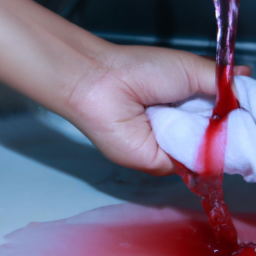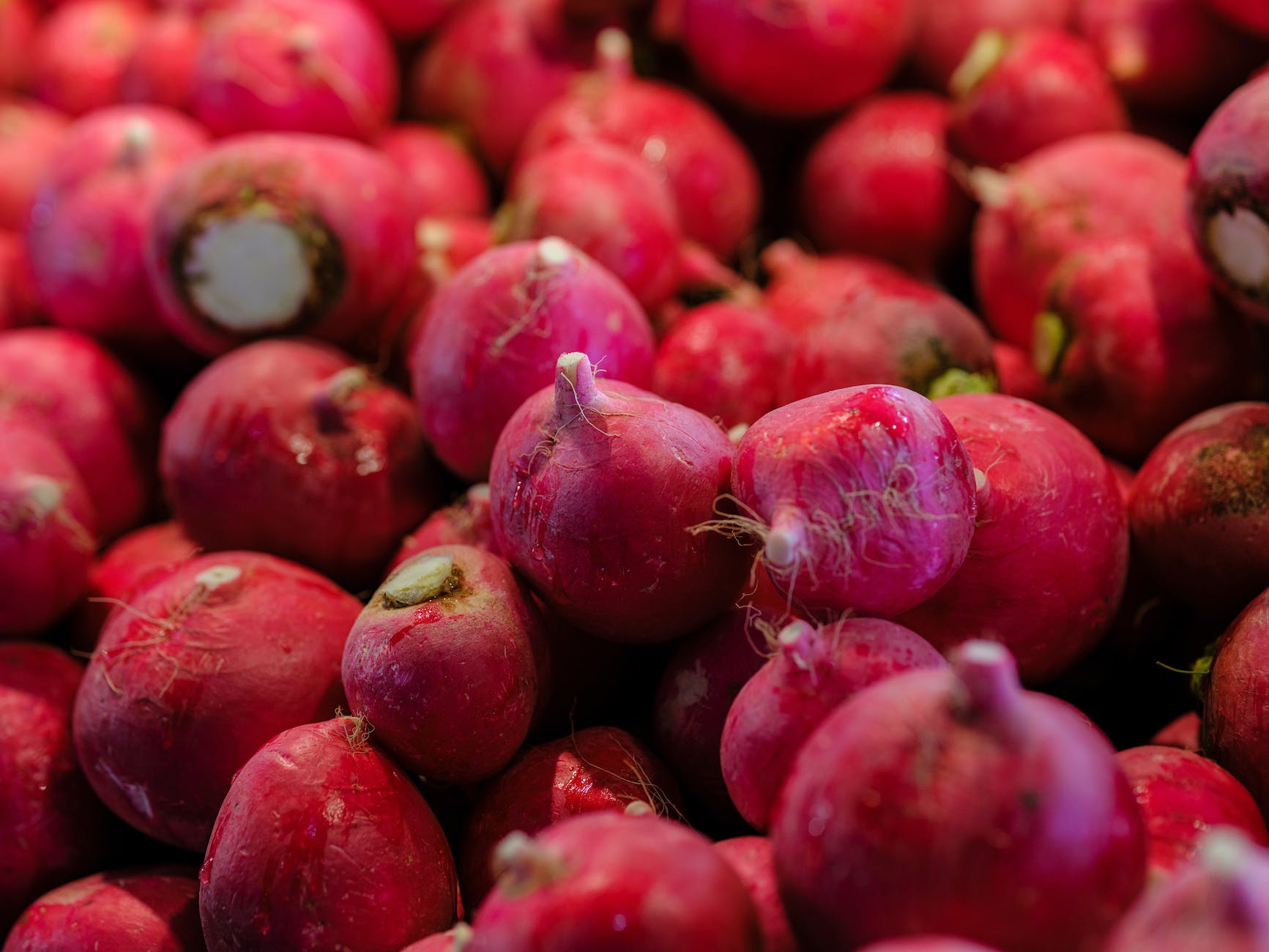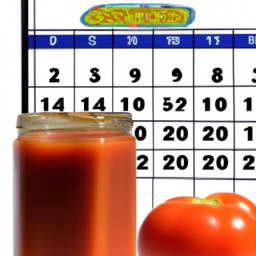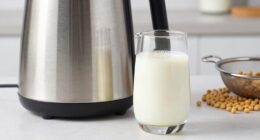Last night, I was at a friend’s event when I accidentally spilled cranberry juice on my favorite shirt. I panicked at first, thinking the stain would never come out. Luckily, after some quick research, I found several ways to remove cranberry juice stains. I’m excited to share these solutions with you.
First and foremost, it’s essential to act fast and blot the stain immediately. The longer you wait, the harder it becomes to remove the stain.
In this article, we’ll go through different methods, such as using cleaning solutions, dish soap, white vinegar, baking soda, enzyme cleaners, rinsing thoroughly, and drying the fabric. By following these steps, you can ensure that your clothes or carpets will look as good as new, and you won’t have to worry about cranberry juice stains ruining your day.
Key Takeaways
- Act fast and blot immediately to prevent the stain from setting in.
- Use cleaning solutions such as vinegar, baking soda, enzyme cleaners, or dish soap to remove the stain.
- Test the cleaning solution on a small area first and avoid using hot water.
- Repeat the stain removal process if necessary and prevent future stains by immediately blotting spills.
Blot the Stain Immediately
You need to start blotting that cranberry juice stain ASAP before it sets in and ruins your favorite shirt! Preventive measures are always better than curative ones, so if you know you’re going to be enjoying some cranberry juice, wear clothes that are easy to clean.
You can also try using a napkin or cloth to cover your shirt while you drink. If the stain is already there, don’t panic! Grab a clean cloth or paper towel and start blotting from the outside of the stain towards the center. Be gentle and avoid rubbing, as this can spread the stain and make it harder to remove.
If blotting alone doesn’t remove the stain, there are alternative stain removers you can use before applying a cleaning solution. For example, try mixing equal parts vinegar and water and dabbing the solution onto the stain. Let it sit for a few minutes before blotting it up.
Another option is to mix baking soda and water to form a paste and apply it directly to the stain. Let it sit for 15-20 minutes before rinsing it off with cold water. Remember, the key is to act quickly and avoid letting the stain set in.
Now, let’s move on to applying a cleaning solution.
Apply a Cleaning Solution
To effectively remove the stain, it’s important to apply a cleaning solution containing white vinegar and warm water in a 1:1 ratio. According to a survey by the American Cleaning Institute, 82% of people find vinegar to be an effective cleaning agent.
Here are some tips to ensure you get the best results when using a cleaning solution:
- Test the solution on a small, inconspicuous area of the fabric first.
- Do not use hot water, as this may set the stain further.
- Blot the stain gently with a clean cloth; do not rub or scrub.
While vinegar is a popular and effective option, there are also other cleaning solution alternatives available. For example, you can try mixing baking soda and water to form a paste, or using a specialized stain remover. However, it’s important to be cautious when using any cleaning solution.
Always read the label and follow the instructions carefully, and avoid using too much product or leaving it on for too long.
Once you’ve applied the cleaning solution and rinsed the fabric thoroughly, it’s time to move on to the next step: using dish soap.
Use Dish Soap
So, when it comes to cleaning cranberry juice stains, one of the most effective solutions is to use dish soap.
To start off, I usually mix a small amount of dish soap with warm water in a bowl or bucket. Then, I apply the soapy mixture directly onto the stain, making sure to cover it completely.
Finally, I blot the area with a clean cloth, repeating the process until the stain disappears. This method has proven to be quite practical and efficient for me in getting rid of stubborn cranberry juice stains.
Mix with Warm Water
Simply mix some warm water with the cranberry juice stain to help lift it from the fabric. This is one of the most effective ways to remove cranberry juice from clothing, carpet, or upholstery.
Here are some benefits of drinking cranberry juice, different ways to mix cranberry juice in warm water, and how to apply the mixture to the stain:
-
Cranberry juice is rich in antioxidants that help improve overall health and prevent chronic diseases.
-
Mixing cranberry juice with warm water can create a natural stain remover that’s safe for most fabrics.
-
The warm water helps to loosen the stain and the cranberry juice helps to break down the pigments.
To apply the mixture to the stain, simply pour it over the affected area and let it soak for a few minutes. Use a clean cloth to blot the stain and repeat the process until the stain is gone.
With this simple method, you can easily remove cranberry juice stains and keep your fabrics looking clean and fresh.
Apply to the Stain
After mixing warm water and cranberry juice, the resulting solution can be applied to the stain with a cloth for effective removal. However, it is important to take preventive measures to avoid the need for stain removal in the first place. One way to do this is to immediately blot any spills or stains with a clean cloth or paper towel before they have a chance to set in.
If the cranberry stain does persist, there are alternative solutions that can be used in addition to the warm water and cranberry juice mixture. For example, a paste made from baking soda and water can be applied to the stain and left to dry before being wiped away with a damp cloth. Additionally, white vinegar can be mixed with water in a 1:1 ratio and sprayed onto the stain before being blotted away with a clean cloth. By taking these steps, you can effectively remove cranberry juice stains and prevent them from setting in. Now, to continue the process, you can blot the stain with a clean cloth.
Blot with a Clean Cloth
To effectively remove the cranberry juice stain, start by blotting it with a clean cloth. This method can also be used to remove other types of stains. Here are five key tips to keep in mind while blotting:
- Use a clean cloth to avoid transferring any dirt or debris onto the stain.
- Blot gently to avoid pushing the stain deeper into the fabric.
- Work from the outside edge of the stain towards the center to prevent spreading the stain further.
- Switch to a new clean cloth if the current one becomes saturated with juice.
- Continue blotting until no more juice can be absorbed.
Using a blotting technique can be effective in removing cranberry juice stains. However, it’s important to act quickly to prevent the stain from setting in.
In the next section, we’ll discuss how to use white vinegar to further remove the stain.
Try White Vinegar
You can easily remove cranberry juice stains by using white vinegar, which is a powerful natural cleaner that works wonders on tough stains. White vinegar has many uses beyond stain removal – it can also be used as a disinfectant, deodorizer, and even as a natural weed killer.
To make homemade cleaning solutions with white vinegar, simply mix equal parts of white vinegar and water in a spray bottle and use it to clean countertops, floors, and other surfaces.
To remove cranberry juice stains with white vinegar, start by blotting the stain with a clean cloth to soak up as much of the juice as possible. Then, mix one tablespoon of white vinegar with two cups of cold water and apply the solution to the stain. Let it sit for 10-15 minutes before blotting it up with a clean cloth. Repeat the process if necessary until the stain has disappeared.
Once the stain is gone, you can move on to the next step – using baking soda to neutralize any remaining odors.
Use Baking Soda
After trying white vinegar and finding it unsuccessful in removing cranberry juice stains, I decided to try another household item – baking soda. Baking soda is known for its various uses, including as a natural cleaning agent. I learned that it could be effective in removing tough stains such as cranberry juice.
To use baking soda to remove cranberry juice stains, I first wet the stained area with water and then sprinkled a generous amount of baking soda on top. I let it sit for about 30 minutes, allowing the baking soda to penetrate the fibers of the fabric and break down the stain. Afterward, I washed the item as usual and was pleased to see that the cranberry juice stain was significantly lighter.
Baking soda benefits are not limited to stain removal. It can also be used for cleaning, deodorizing, and even as a gentle exfoliant for the skin. It’s a versatile and affordable household item that can replace many expensive cleaning products. With its various uses, it’s a must-have in any household.
Now, let’s move on to the next section and learn about another household item that can be used to remove cranberry juice stains – hydrogen peroxide.
Try Hydrogen Peroxide
So, when it comes to getting rid of cranberry juice stains, another effective solution that I’ve found is hydrogen peroxide.
To use it, I mix it with water to dilute it and then apply it to the stain. After letting it sit for a few minutes, I blot the area with a clean cloth to lift the stain.
It’s a simple and practical solution that has worked well for me in the past.
Mix with Water
Mixing water with cranberry juice is a simple and effective way to dilute the stain and make it easier to remove. While cranberry juice has many health benefits, its deep red color can leave a stubborn stain on clothing, carpets, or furniture.
To start the removal process, mix equal parts water and cranberry juice, then use a clean cloth to dab the mixture onto the stained area. This will help to dilute the stain and prevent it from setting in further. Apply to the stain and continue with the next step.
Aside from its staining properties, cranberry juice is a popular summer drink that can be enjoyed in many different ways. From classic cranberry juice recipes to refreshing summer cocktails, it’s a versatile ingredient that’s perfect for any occasion. However, if you do find yourself dealing with a cranberry juice stain, don’t worry – with a little bit of water and a lot of patience, it’s easy to remove.
Apply to the Stain
Ready to tackle that stubborn stain? Let’s apply the water and cranberry juice mixture directly onto the affected area to start the removal process. To do this, follow these easy steps:
- Pour a small amount of the mixture onto the stain.
- Use a clean cloth or sponge to gently rub the solution into the fabric.
- Let the mixture sit for about 5-10 minutes to allow it to penetrate the stain.
- Rinse the area with cold water to remove the mixture and any remaining stain.
While this method can be effective in removing cranberry juice stains, it’s important to note that preventive measures and alternative solutions can also help in the removal process. For example, if you spill cranberry juice on your clothes, try to treat the stain as soon as possible to prevent it from setting in. Additionally, you can try using commercial stain removers or natural remedies like vinegar or baking soda to tackle the stain.
With the stain treatment underway, the next step is to blot with a clean cloth to remove any excess moisture.
Blot with a Clean Cloth
Now it’s time to gently dab the affected area with a clean cloth, using blotting techniques to lift any remaining cranberry juice stain from the fabric. Avoid rubbing the stain, as this can cause it to spread and embed deeper into the fabric fibers. Instead, gently press the cloth onto the stain, allowing it to absorb the excess moisture.
When choosing a cleaning solution to use for blotting, it’s important to consider the type of fabric and the severity of the stain. For delicate fabrics, such as silk or wool, it’s best to use a mild detergent or a specialized fabric cleaner. For tougher stains and fabrics, a mixture of water and vinegar or hydrogen peroxide can be effective in lifting the stain. Always test the cleaning solution on an inconspicuous area of the fabric first to ensure it doesn’t cause any damage or discoloration.
Enzyme cleaners can be particularly effective for stubborn cranberry juice stains that haven’t been fully lifted with blotting techniques.
Use Enzyme Cleaners
Using enzyme cleaners is a great way to eliminate cranberry juice stains without damaging your carpet or furniture. Enzyme cleaners contain natural enzymes that break down the proteins in the stain, making it easier to remove.
Here are some benefits of using enzyme cleaners for cranberry juice stains:
- They’re safe for use on most fabrics and surfaces.
- They’re environmentally friendly and contain natural ingredients.
- They’re effective in removing tough stains, including cranberry juice.
If you prefer natural alternatives to enzyme cleaners, you can try using vinegar and baking soda. However, enzyme cleaners are specifically designed to break down protein stains like cranberry juice, so they may be more effective.
Once you’ve applied the enzyme cleaner, make sure to rinse thoroughly to remove any residue and prevent damage to your carpet or furniture.
Rinse Thoroughly
When it comes to removing stains, rinsing thoroughly is a crucial step. I always start by using warm water to flush out as much of the stain as possible.
Then, I blot the area with a clean cloth to absorb any excess liquid. If the stain persists, I repeat the process until it’s completely gone.
Use Warm Water
By pouring warm water over the stain, you’ll be able to loosen up the cranberry juice and eliminate the stubborn mark in no time. Warm water is beneficial when dealing with cranberry juice stains as it helps to break down the pigments in the juice. This makes it easier to remove the stain from the fabric.
Additionally, acting fast when dealing with cranberry juice stains is important as the longer the stain is left untreated, the harder it will be to remove. When using warm water to remove cranberry juice stains, it’s important to pour the water over the stain as soon as possible. This will help to prevent the stain from setting into the fabric.
Gently blot the stain with a clean cloth to remove any excess juice. Once you’ve soaked the fabric in warm water, you can move on to the next step of blotting the stain with a clean cloth.
Blot with a Clean Cloth
To effectively remove the stubborn cranberry juice stain, gently dab a clean cloth onto the affected area, allowing the warm water to absorb the juice from the fabric. Blotting the area rather than rubbing it will prevent the stain from spreading and becoming more difficult to remove.
Here are some alternative methods to try if the warm water and blotting technique does not work:
- Mix equal parts white vinegar and warm water, then gently dab onto the stain with a clean cloth.
- Apply a small amount of rubbing alcohol onto the stain and blot with a clean cloth until the stain disappears.
Preventing future stains can save you the trouble of having to remove them later. One way to do this is by treating any spills or stains immediately by blotting them with a clean cloth and using a stain remover if necessary.
Another way is to use a protective spray on your fabrics to repel liquids. Remember to repeat the stain removal process as needed until the stain is completely gone.
Repeat as Needed
You may need to repeat the stain removal process multiple times until the fabric is completely free of any remaining discoloration. This is especially true if the cranberry juice stain has been left unattended for a long time or if it has already set into the fabric.
Don’t be discouraged if the first attempt doesn’t completely eliminate the stain. Simply repeat the process until the fabric is completely clean.
To prevent future stains, consider taking some preventive measures. For example, avoid eating or drinking while wearing the clothing or using a tablecloth. If spills do occur, try to clean them as quickly as possible to prevent the stain from setting in.
If the cranberry juice stain persists, you may want to try some alternative methods such as using vinegar or baking soda. These household items have proven effective in removing stubborn stains.
Once the stain has been completely eliminated, it’s important to dry the fabric properly to avoid any potential damage.
Dry the Fabric
First, lay the stained fabric flat on a towel and gently press to remove any excess cranberry juice.
Next, it’s important to dry the fabric properly to prevent discoloration. Here’s how to do it:
-
Choose the right drying method: Avoid using high heat as it can set the stain and make it harder to remove. Instead, air-dry the fabric by hanging it or laying it flat in a well-ventilated area.
-
Use a clean towel: Place a clean towel over the stain and press down gently to absorb any remaining moisture.
-
Avoid direct sunlight: Sunlight can cause the fabric to fade or discolor, so it’s best to keep it out of direct sunlight while drying.
-
Repeat if necessary: If the stain is still visible after drying, repeat the process until it’s completely gone.
If the stain persists despite your efforts, it may be time to consider professional cleaning services. With their expertise and specialized equipment, they can effectively remove the stain and restore your fabric to its original condition.
Consider Professional Cleaning Services
I hope the previous subtopic about drying the fabric has been helpful. However, if the cranberry juice stain persists, it’s time to consider hiring professional cleaning services.
There are several benefits to hiring professionals. They have access to specialized equipment and cleaning solutions that can effectively remove even the toughest stains. Additionally, they have the expertise to handle different types of fabric without damaging them.
Hiring professionals can save you time and effort, as they will take care of the cleaning process from start to finish. So, if you want to ensure that your fabric is restored to its original condition, it’s worth considering professional cleaning services.
Frequently Asked Questions
What are some common causes of cranberry juice stains?
As a homeowner, I’ve learned that common causes of cranberry juice stains include spills on carpets, clothing, and upholstery. Pre-treating tips like using a vinegar solution can help, but for tougher stains, professional cleaning services may be necessary.
Can cranberry juice stains be removed from all types of fabric?
Believe it or not, there isn’t a single type of fabric that can withstand a cranberry juice stain. But fear not, there are effective removal methods for all types of fabric.
Are there any home remedies for preventing cranberry juice stains?
I’ve found that there are many effective home remedies for preventing cranberry juice stains. Some natural solutions include using white vinegar or salt to treat the stain before washing, or using a stain-resistant fabric spray before wearing.
How long does it take for cranberry juice stains to set in?
Prevention methods are key to avoiding cranberry juice stains. If a spill does occur, quick removal tips include blotting with a clean cloth, applying a mixture of vinegar and water, and laundering with an enzyme-based detergent.
What are some alternative methods for removing cranberry juice stains besides the ones listed in the article?
When it comes to tough stains, I’ve learned to never give up! Besides DIY stain removers, professional cleaning services can also be a great option. Don’t let a stubborn stain bring you down, there’s always a solution.
Conclusion
In the end, getting out cranberry juice is all about being quick and resourceful. As I’ve learned from my own experience, blotting the stain immediately is crucial to preventing it from setting. But don’t despair if you’re not able to remove the stain right away.
There are many cleaning solutions you can try, including dish soap, white vinegar, and baking soda. Enzyme cleaners can also be effective in breaking down the stain and removing it from the fabric.
Ultimately, the process of getting out cranberry juice is a metaphor for life. Just as we must act quickly to prevent problems from becoming worse, we must also be resourceful and adaptable in finding solutions to the challenges we face. And just as we must rinse and dry the fabric after cleaning it, we must also take steps to heal and restore ourselves after overcoming adversity.
So next time you find yourself facing a tough stain, remember that with a little effort and ingenuity, you can always find a way to get it out.









